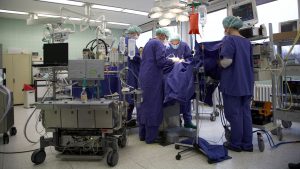Responsibility for outcomes requires accepting leadership roles in hospitals
Urgent calls for medical leadership have dramatically increased as healthcare delivery systems grapple with reform, constrained resources, and demand. The unprecedented COVID-19 crisis brought the relevance of professional and efficient medical leadership front and center. Notably, new challenges require robust leadership and management tools to ascertain excellent and repeatable outcomes while providing maximum safety for the patients and the personnel. Despite the increasing bureaucracy and influence of hospital administration, physicians are still generally held fully accountable for all clinical outcomes. This responsibility alone would constitute the care providers’ predominant role in medical management and leadership in hospitals.Straightforward medical management supports healthcare excellence
Furthermore, there is an overwhelming consensus that physician and nursing excellence is necessary but not exclusive to generate positive clinical outcomes. The quality of interactions and performance of all supporting processes and microsystems determine the performance and quality in healthcare.Healthcare systems are fundamentally complex due to the highly intricate intertwining of interprofessional interactions and dependencies. Thus, medical experts should significantly influence the design of the hospitals` infrastructure, processes, communication, leadership, partnerships, and administration if the patients` wellbeing is the hospitals` focus. Studies show a positive correlation between the degree of medical knowledge and education of hospital leaders and the hospital`s medical and even economic outcomes.
Hospitals are highly unsafe.
Since adverse events and iatrogenic errors rank among the top 10 causes for in-hospital death after cancer and cardiovascular diseases, hospital safety should be the number one concern of every hospital and healthcare network. 134 M adverse events are reported from hospitals in emerging markets annually. Worldwide there is a 1/300 chance of harm in healthcare compared to a 1/1,000,000 ratio in aviation, which indicates the need for improving safety measures in hospitals.Hospital safety not only for the patients
Additionally, hospital safety should not be narrowed to the patients` perspective but comprise the employees` career and health as well. We have witnessed that the front-line healthcare workers represent a dominant proportion of the people at risk of death and infection in the recent pandemic.Of course, healthcare professionals were always exposed to such risks, but the pandemic brought that to a sharper focus.
Healthcare professionals in leadership positions
Conclusively, healthcare professionals should take leading positions in the hospitals, at least on equal terms with non-medical managers. Unfortunately, physicians, in general, have been profoundly ambivalent about taking a leadership role within hospitals or healthcare networks. This has caused, over a period, significant erosion of the physicians’ ability to influence hospital operations and re-design future services. The ambivalence amongst physicians and medical practitioners can be traced to the following reasons:1. Sense of disenfranchisement
2. Lack of adequate tools and knowledge about running profitable enterprises
3. Scarcity of time to pursue theoretical and generic management courses
4. Perceived sense of better financial incentives as physician instead of management
5. Perceived higher sense of prestige and status in society of doctors in comparison to managers
6. Suspicion about the motivation of management staff in general
Supporting physicians and nurses in leadership
On the one hand, it is abundantly clear that physicians, nurses, and other healthcare professionals need a practical framework in the fields of medical management and leadership that is not provided in any medical studies or education. This framework closes the knowledge gap between them and non-medical hospital managers. On the other hand, non-medical leaders like jurists and economists should be equipped with a clinical, yet still business-oriented perspective on the hospital.The Hannover-Medical.Management framework
Hannover-Medical.Management provides a framework of medical management and leadership that includes a curriculum of four courses for healthcare professionals desirous of immediately applicable management tools. Over the last 15 years we identified four relevant management areas for physicians, nurses, and hospital managers:
First, we found that understanding the hospital`s perspective on business is necessary to align healthcare leadership to the hospital`s strategy, which improves the economic and medical outcomes.
Second, lean management in healthcare leads to better work satisfaction and – again – better results.
Third, therefore, understanding hospital economics is required.
Fourth, efficient management and leadership techniques improve your work-life-balance and boost your career significantly.
Second, lean management in healthcare leads to better work satisfaction and – again – better results.
Third, therefore, understanding hospital economics is required.
Fourth, efficient management and leadership techniques improve your work-life-balance and boost your career significantly.




